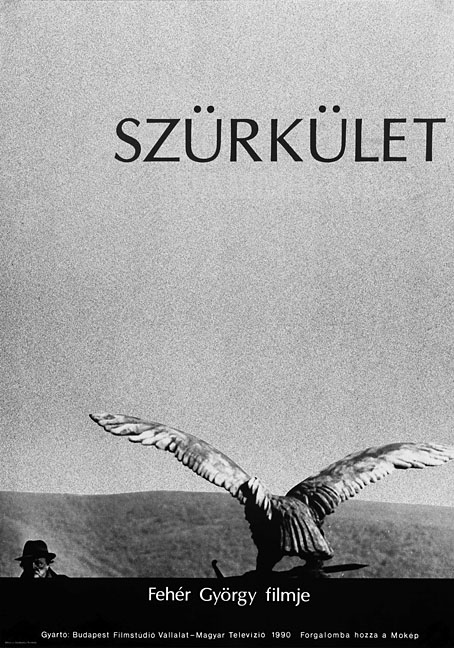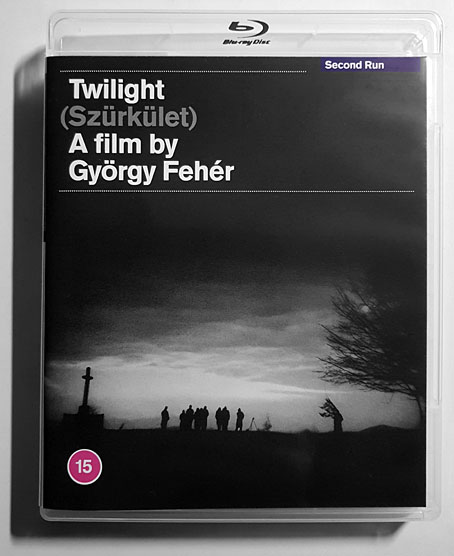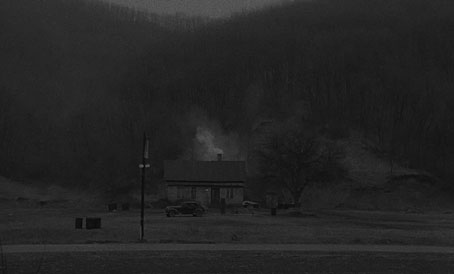There’s a Thomas Ligotti story—you’ll have to forgive my not recalling the title—in which the world is suffused in an inexplicable and persistent twilight, a condition that you see manifested for real in this remarkable film by György Fehér. Twilight was released in 1990 but for a long time hasn’t been easy to see. Second Run announced their region-free blu-ray edition a couple of months ago, another film which, like Son of the White Mare, is a restoration presented by the National Film Institute of Hungary. The new disc arrives with filmed appreciations by the Quay Brothers, Peter Strickland and others. Mention in the publicity of the Quays, Strickland and Béla Tarr, who the film credits as a consultant, was enough to make me order this without knowing anything further.

A seasoned detective investigates a series of child murders, succumbing to an all-consuming and tragic obsession with the case, finding empty solace in his quest for vengeance. What emerges is not a crime story, but a harrowing venture through the darkness of the human soul.
Twilight unfolds with breathtaking cinematography and haunting sound design, allowing the mystery to emerge in tantalisingly atmospheric and meditative fashion.
A police procedural, then, but not one like any you’ve seen before. The narrative is reduced to a skeletal trace, subsumed, like Ligotti’s world, by the twilight atmosphere. Tarr’s films are an obvious reference here; Fehér’s investigation takes place in the same misty, rain-sodden rural nowhere as Sátántangó (which Fehér helped produce), and shares with Tarr’s epic a similar approach to shot duration and camera movement. Fehér was a cinematographer before he became a director, so the shots may be long but they’re also mesmerising and perfectly choreographed. The film is placeless and also rather timeless, in that it’s evidently set in the past but the antique quality might equally be the product of an isolated backwater. All the cars and phones and typewriters look old, while the men wear big coats and big hats; the atmosphere isn’t so much film noir as film gris. (Fehér followed Twilight with an adaptation of The Postman Always Rings Twice which I now have to see.)
There’s a lot more I could say about this but I hadn’t really intended to write a review. I ought to note, however, the three musical cues which sustain the sombre visuals, and which repeat throughout: the opening chords from Béla Bartók’s Bluebeard’s Castle; the opening chords of Brüder Des Shattens—Sohne Des Lichts by Popol Vu, which are slowed and muted to create a Thomas Köner-like drone; and (very surprisingly) the last minute or so of Hello Earth by Kate Bush, which seems to have been used mainly for the song’s borrowing of Tsintskaro, a Georgian folk song which most people know either from The Hounds Of Love or from its earlier appearance in the plague scenes in Werner Herzog’s Nosferatu. I recognised the Bush track immediately, and was a little disconcerted at first, but the music is as muted as the other pieces, and subtly looped to create a refrain which contrasts with Bartók’s ominous overture, something we may take as a leitmotif for the murdered girls.
As I was saying only a couple of weeks ago, “it’s a big cinematic world out there, and ‘world cinema’ is more than just a few shelves in an entertainment store”. It is indeed. Consider this Exhibit A.
Previously on { feuilleton }
• The Cremator by Juraj Herz



Everything you’re describing sounds set to transport me the way ‘Once Upon A Time In Anatolia’ did when I saw it in the theatre. Bookmarking for later– and also thank you for pointing out ‘Bluebeard’s Castle’. Extremely useful for current endeavors!
Region free! A balm for the weary American fan of euro-cinema.
The Lost Art of Twilight, perhaps? An early Ligottian homage to Poe.
Yes, that may be the story, I’ll have to check. Probably time to read my Ligotti books again.
The region issue must depend on licencing elsewhere, Arrow and Eureka seldom have anything available region-free.
I’ve never owned a blu-ray player before, but with this and the recent release of ‘On the Silver Globe’ on blu-ray, I think it’s time I finally upgraded.
They’re very worthwhile today: the players are relatively cheap (my small Sony player cost just over £100 compared to the £400 I spent on my first DVD player years ago) and there’s a huge range of films available. I held out for a long while since I used to watch most things on my big computer screen. This became increasingly unworkable when the BR software players stopped updating themselves. My Sony box also does a great job of upscaling DVDs so it doesn’t render your older discs redundant.
I have indeed made the jump and ordered myself a Blu-ray player (£73), plus a copy of Twilight. Really looking forward to watching it. ??
Two loose thoughts:
1. “…in which the world is suffused in an inexplicable and persistent twilight…”
Thanks to global warming and our leaders’ refusal to do what needs to be done — a global response to a global crisis — that’s a description of the world that will be here soon.
Did a cross-country trip in the US in 2021. At the time, Oregon and Washington were suffering from unusal summer heat and a shit ton of fires. Result: Hazy skies for two thirds of the trip back to NY. Didn’t get normal blue skies til Michigan or so — ~1500-2000 miles from the fires.
2. “‘A seasoned detective investigates a series of child murders, succumbing to an all-consuming and tragic obsession with the case, finding empty solace…'”
That is an approximate — not fully correct — description of Sydney Powell.